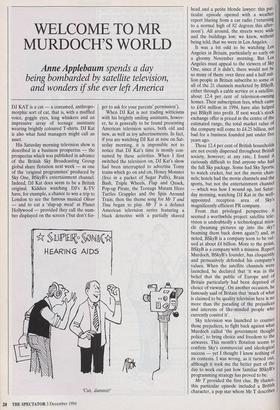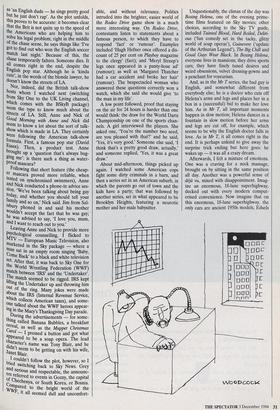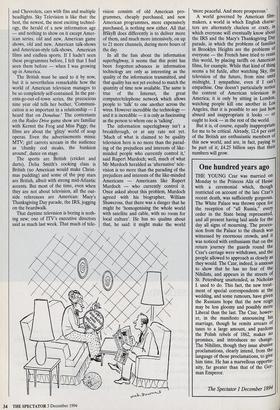WELCOME TO MR MURDOCH'S WORLD
Anne Applebaum spends a day
being bombarded by satellite television, and wonders if she ever left America
DJ KAT is a cat — a costumed, anthropo- morphic sort of cat, that is, with a muffled voice, goggle eyes, long whiskers and an impressive array of teenage assistants wearing brightly coloured T-shirts. DJ Kat is also what fund managers might call an asset.
His Saturday morning television show is described in a business prospectus — the prospectus which was published in advance of the British Sky Broadcasting Group global share flotation next week — as one of the 'original programmes' produced by Sky One, BSkyB's entertainment channel. Indeed, DJ Kat does seem to be a British original. Kiddies watching DJ's K-TV have, for example, a chance to win a trip to London to see the famous musical Oliver — and to eat a `slap-up meal' at Planet Hollywood — provided they call the num- ber displayed on the screen ('but don't for- get to ask for your parents' permission').
When DJ Kat is not trading witticisms with his brightly smiling assistants, howev- er, he is generally to be found presenting American television series, both old and new, as well as toy advertisements. In fact, if you are watching DJ Kat at nine on Sat- urday morning, it is impossible not to notice that DJ Kat's time is mostly con- sumed by these activities. When I first switched the television on, DJ Kat's show had been interrupted to advertise Tomy trains which go on and on, Honey Monster (free in a packet of , Sugar Puffs), Brain Bash, Triple Wheels, Flap and Quack, Pop-up Pirate, the Teenage Mutant Hero Turtles Grappler and the Spin Around Train; then the theme song for Mr T and Tina began to play. Mr T is a defunct American television series featuring a black detective with a partially shaved 'Cut, dammit!' head and a petite blonde lawyer: this par- ticular episode opened with a weather report blaring from a car radio ('returning to a normal high of 82 degrees this after- noon). All around, the streets were wide and the buildings low; we knew, without being told, that we were in Los Angeles.
It was a bit odd to be watching Los Angeles in Britain, particularly so early on a gloomy November morning. But Los Angeles must appeal to the viewers of Sky One, since if it didn't, there would not be so many of them: over three and a half mil- lion people in Britain subscribe to some or all of the 21 channels marketed by BSkyri, either through a cable service or a satellite, about 12.4 per cent of television-owning homes. Their subscription fees, which came to £454 million in 1994, have also helped put BSkyB into profit. If next week's stock exchange offer is priced in the centre of the estimated range, the total market value of the company will come to £4.25 billion, not bad for a business founded just under five years ago.
These 12.4 per cent of British households are not evenly dispersed throughout British society, however; at any rate, I found it curiously difficult to find anyone who had the full Sky package. Some had Sky Sports, to watch cricket, but not the movie chan- nels; hotels had the movie channels and the sports, but not the entertainment channel — which was how I wound up, last Satur- day morning, watching DJ Kat in the well- appointed reception area of Sky's magnificently efficient PR company. From that privileged perspective it seemed a worthwhile project: satellite tele- vision is undoubtedly a technological mira- cle (beaming pictures up into the sle beaming them back down again?) and, as noted, BSkyB is a company soon to be val- ued at about £4 billion. More to the point, BSkyB is a company with a mission. Rupert Murdoch, BSkyB's founder, has eloquently and persuasively defended his company's values. When the satellite channels were launched, he declared that 'it was in the belief that the public of Europe and of Britain particularly had been deprived of choice of viewing'. On another occasion, he famously said of Britain that 'much of what is claimed to be quality television here is no more than the parading of the prejudices and interests of like-minded people who currently control it'.
Sky television was launched to counter those prejudices, to fight back against what Murdoch called 'the government thought police', to bring choice and freedom to the airwaves. This month's flotation seems to confirm Sky's commercial and ideological success — yet I thought I knew nothing of its contents. I was wrong, as it turned out, although it took me the better part of the day to work out just how familiar BSkyB's programming strategy has proved to be.
Mr T provided the first clue. By chance, this particular episode included a British character, a pop star whom Mr T describes as 'an English dude — he sings pretty good but he just don't rap'. As the plot unfolds, this proves to be accurate: it becomes clear that the Brit is not quite up to the speed of the Americans who are helping him to solve his legal problem; right in the middle of the chase scene, he says things like 'I've got to find out who won the English soccer match last night.' Because of this, the chase temporarily falters. Someone dies. It all comes right in the end, despite the English pop star. Although he is 'Idnda cute', in the words of the blonde lawyer, he doesn't know the streets of LA.
Nor, indeed, did the British talk-show hosts whom I watched next (switching from Sky One to the UK Living channel, Which comes with the BSkyB package) Seem the type to know much about the streets of LA. Still, Anne and Nick of Good Morning with Anne and Nick did seen' to know a lot about the sort of talk- show which is made in LA. They certainly were following the American talk-show formula. First, a famous pop star (David Essex). Then, a product test. Anne brought up a 'question that's always bug- ging me': is there such a thing as water- proof mascara?
Following that short feature (the cheap- er mascara proved more reliable, when tested on synchronised swimmers), Anne and Nick conducted a phone-in advice ses- sion. 'We've been talking about being gay IntlaY, and whether you should tell your 911'14 and so on,' Nick said. Jim from Sal- isbury phoned in and said his mother wouldn't accept the fact that he was gay; he was advised to say, 'I love you, mum, and I want to reach out to you.' Leaving Anne and Nick to provide more Psychological counselling, I flicked to MTV — European Music Television, also marketed in the Sky package — where a man sat in an empty room singing 'Baby, Come Back' to a black and white television ser. After that, it was back to Sky One for the World Wrestling Federation (WWF) match between 'IRS' and the 'Undertaker'. The match seemed to be rigged. IRS kept lifting the Undertaker up and throwing him o_ut of the ring. Many jokes were made about the IRS (Internal Revenue Service, Which collects American taxes), and some- One talked about the WWF heroes appear- ing in the Macy's Thanksgiving Day parade. Poring the advertisements — for some- thing long called Banana Bubbles, a breakfast cereal, as well as the Muppet Christmas Carol — I pressed a button and got what appeared to be a soap opera. The lead character's name was Tony Blair, and he didn't seem to be getting on with his wife, Janet Blair.
couldn't follow the plot, however, so I tried switching back to Sky News. Grey and serious and respectable, the announc- ers referred to events in Gozny, the capital of Chechenya, or South Korea, or Bosnia. Compared to the bright world of the WWF, it all seemed dull and uncomfort- able, and without relevance. Politics intruded into the brighter, easier world of the Rodeo Drive game show in a much more interesting way. On Rodeo Drive, contestants listen to statements about a famous person, to which they have to respond 'fact' or 'rumour'. Examples included 'Hugh Hefner once offered a dis- count of 25 per cent on Playboy magazine to the clergy' (fact); and 'Meryl Streep's legs once appeared in a panty-hose ad' (rumour); as well as 'Margaret Thatcher had a car accident and broke her hair' (rumour). The bespectacled woman who answered these questions correctly won a watch, which she said she would give `to the man in my life'.
A low point followed, proof that staying on the air for 24 hours is harder than one would think: the draw for the World Darts Championship on one of the sports chan- nels. A girl interviewed the players. She asked one, 'You're the number two seed, are you pleased with that?' and he said, 'Yes, it's very good.' Someone else said, 'I think that's a pretty good draw, actually,' and someone replied, 'Yes, it was a great draw.'
About mid-afternoon, things picked up again. I watched some American cops fight some dirty criminals in a barn, and then a series set in an American suburb, in which the parents go out of town and the kids have a party; that was followed by another series, set in what appeared to be Brooklyn Heights, featuring a neurotic mother and her male babysitter. Unquestionably, the climax of the day was Boxing Helena, one of the evening prime- time films featured on Sky movies; other choices, according to the Sky TV guide, included Tainted Blood, Hard Boiled, Deliri- ous ('fun comedy set in the tacky, glitzy world of soap operas'), Guinevere ('update of the Arthurian Legend'), The Big Chill and Good Guys Wear Black. In Boxing Helena, everyone lives in mansions; they drive sports cars; they have finely tuned desires and weird obsessions, velvet dressing-gowns and a penchant for voyeurism.
And, as in the Mr T series, the bad guy is English, and somewhat different from everybody else; he is a doctor who cuts off Helena's arms and legs and places her in a box in a (successful) bid to make her love him. As in Mr T, all important moments happen in slow motion; Helena dances in a fountain in slow motion before her arms and legs are cut off, for example, which seems to be why the English doctor falls in love. As in Mr T, it all comes right in the end. It is perhaps unkind to give away the surprise trick ending but here goes: he wakes up — it was all a crazy dream. Afterwards, I felt a mixture of emotions. One was a craving for a neck massage, brought on by sitting in the same position all day. Another was a powerful sense of déjà vu, mixed with disappointment. Imag- ine an enormous, 18-lane superhighway, decked out with every modern comput- erised convenience. Now imagine that on this enormous, 18-lane superhighway, the only cars are ancient 1950s models, Edsels and Chevrolets, cars with fins and multiple headlights. Sky Television is like that: the best, the newest, the most exciting technol- ogy, the herald of a new information age — and nothing to show on it except Amer- ican series, old and new, American game shows, old and new, American talk-shows and American-style talk-shows, American films and endless sports. If I hadn't seen these programmes before, I felt that I had seen them before — when I was growing up in America.
The British must be used to it by now, but it is nevertheless remarkable how the world of American television manages to be so completely self-contained. In the par- ents-go-out-of-town series, the precocious nine year old tells her bother, 'Communi- cation is so important in a relationship — I heard that on Donahue.' The contestants on the Rodeo Drive game show are familiar with Kermit the Frog and Miss Piggy; the films are about the 'glitzy' world of soap operas. Even the advertisements mimic MTV; girl carrots scream in the audience as 'chunky cod steaks, the hunkiest around', dance on stage.
The sports are British (cricket and darts), Delia Smith's cooking class is British (no American would make Christ- mas pudding) and some of the pop stars are British, albeit with strong mid-Atlantic accents. But most of the time, even when they are not about television, all the out- side references are American: Macy's Thanksgiving Day parade, the IRS, jogging on the boardwalk.
That daytime television is boring is noth- ing new; one of ITV's executive directors said as much last week. That much of tele- vision consists of old American pro- grammes, cheaply purchased, and new American programmes, more expensively purchased, is nothing new either. All that BSkyB does differently is to deliver more of them, and much more intensively, on up to 21 more channels, during more hours of the day.
In all the fuss about the information superhighway, it seems that this point has been forgotten: advances in information technology are only as interesting as the quality of the information transmitted, and that quality has not yet evolved to match the quantity of time now available. The same is true of the Internet, the great computer/telephone network which allows people to 'talk' to one another across the wires. However incredible the technology — and it is incredible — it is only as fascinating as the person to whom one is 'talking'.
The information superhighway isn't a breakthrough, or at any rate not yet. 'Much of what is claimed to be quality television here is no more than the parad- ing of the prejudices and interests of like- minded people who currently control it,' said Rupert Murdoch; well, much of what Mr Murdoch heralded as 'alternative' tele- vision is no more than the parading of the prejudices and interests of the like-minded Americans — Americans like Rupert Murdoch — who currently control it. Once asked about this problem, Murdoch agreed with his biographer, William Shawcross, that there was a danger that he might be 'homogenising the whole world with satellite and cable, with no room for local culture'. He has no qualms about that, he said: it might make the world 'more peaceful. And more prosperous.'
A world governed by American film' makers, a world in which English charac- ters are alternately clueless or crazy, in which everyone will eventually know about the IRS and the Macy's Thanksgiving Day parade, in which the problems of families in Brooklyn Heights are the problems of everyone — the French have tried to resist this world, by placing tariffs on American films, for example. While that kind of thing seems a bit futile, after watching Sky, the television of the future, from nine until midnight, I sympathise, even if I can't empathise. One doesn't particularly notice the content of American television in America; it is only by sitting in London, watching people kill one another in Los Angeles, that it is possible to see just how absurd and inappropriate it looks — or ought to look — in the rest of the world. But it is, of course, equally inappropriate for me to be critical. Already, 12.4 per cent of the British are enthusiastic members of this new world, and are, in fact, paying to be part of it; £4.25 billion says that their numbers will grow.












































































 Previous page
Previous page